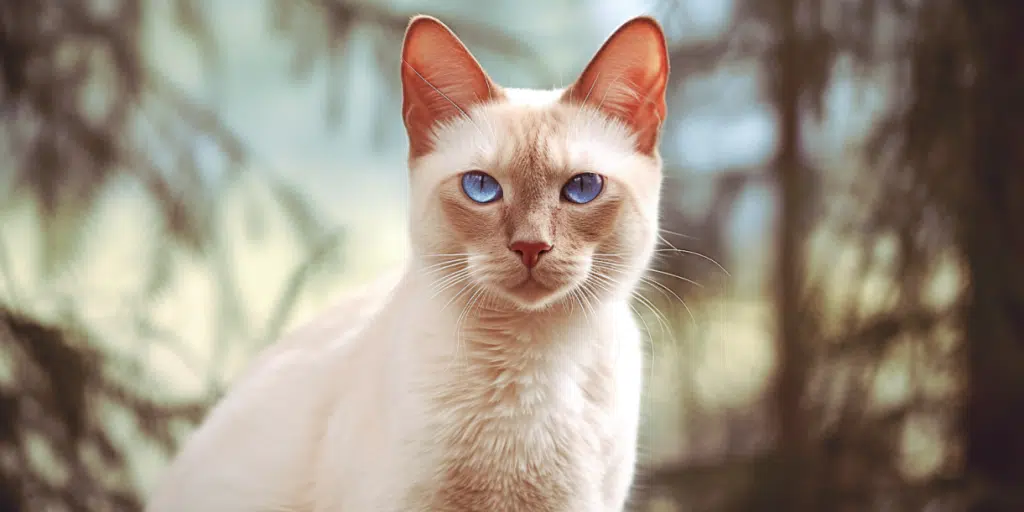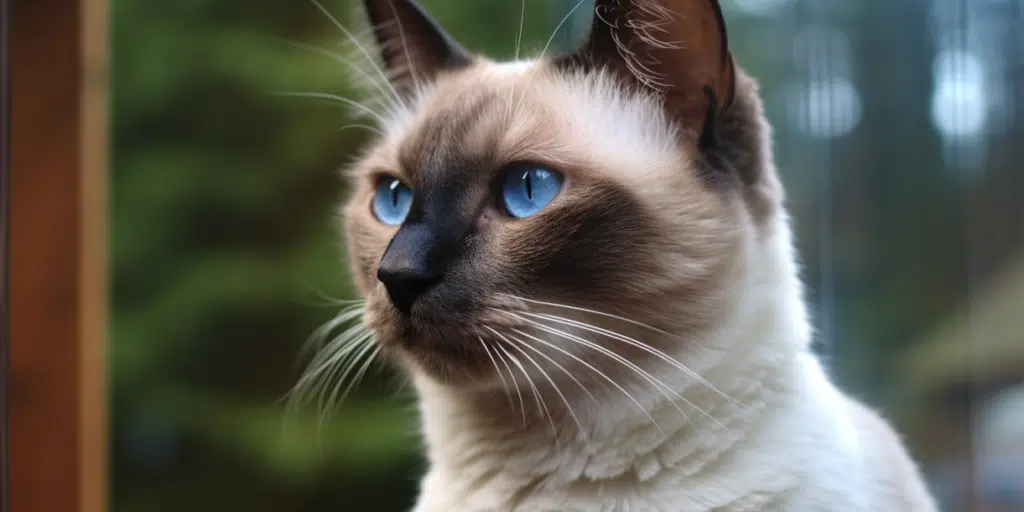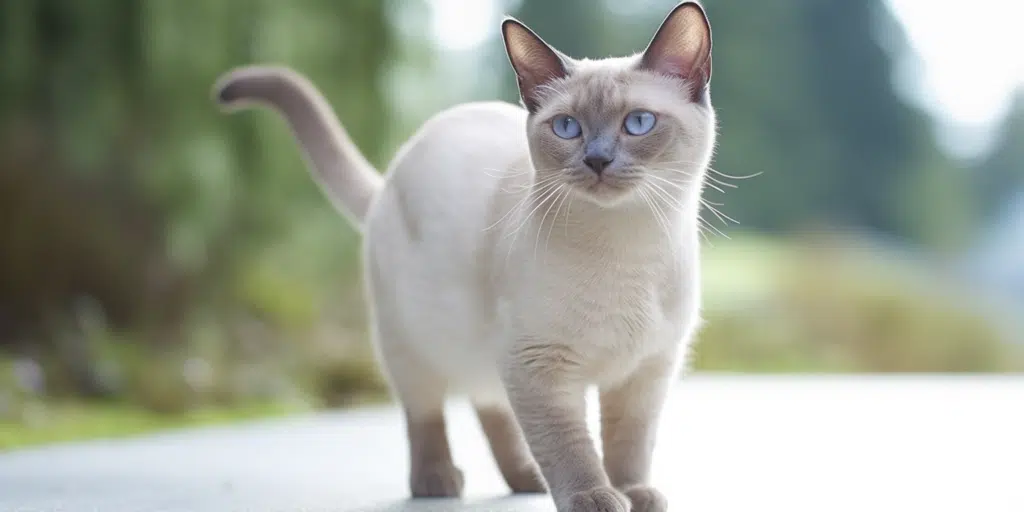Have you ever wondered why Siamese cats are considered the chatterboxes of the cat world? Well, you’re not alone! These felines are famous for their vocal nature, often expressing their needs, desires, and emotions through an array of sounds that can be as captivating as they are puzzling.
In this blog, we’ll dive into the world of Siamese cat noises, exploring everything from the reasons behind their vocal habits to the meanings of their various sounds. So, if you’ve got a Siamese cat ruling your home or you’re simply curious about these talkative cats, you’re in for a treat!
Siamese cats are known for their exceptional vocal abilities, which they use to communicate with their human families. Their meowing is often compared to a baby’s cry, serving various purposes such as demanding attention, expressing dissatisfaction, or sharing their happiness.
Understanding the meanings behind a Siamese cat’s meows is essential, as they use a variety of sounds to express their needs, wants, satisfaction, or discomfort. This vocal behavior starts from kittenhood when they meow to communicate with their mothers, and it continues throughout their lives.

Are Siamese Cats Vocal Cats?
Yes, Siamese cats are well-known for their vocal nature. Unlike some other cat breeds that may only meow occasionally or when they need something specific, Siamese cats use their voices much more frequently and for a broader range of reasons.
Whether it’s a gentle chirp to greet you in the morning, a loud meow when they’re hungry, or a soft purr to show contentment, their communicative nature is part of what makes them so charming.
This vocal behavior is not just about seeking attention; it also reflects the Siamese cat’s social nature. While both male and female Siamese cats are vocal, some pet owners notice that their cat’s noise level might slightly vary based on their gender, with males sometimes being more talkative.
However, individual personality plays a significant role, and some Siamese cats are naturally more vocal than others.
Moreover, a Siamese cat’s activity level can affect their vocalizations. A well-exercised and mentally stimulated Siamese is generally more content and may be less vocal, while boredom or lack of attention can lead to more frequent meowing. Engaging in play and providing interactive toys can help reduce excessive vocalization caused by boredom.
Factors That Influence Siamese Cats Noise Levels

Their Age
Age plays a crucial role in influencing the noise levels of Siamese cats. Kittens are innately more vocal, using their voices to communicate with their mothers. As Siamese cats grow, they retain this vocal nature, yet the reasons for their meows evolve.
Older Siamese cats might vocalize more due to changes in their environment, health issues, or simply to seek more attention as they age.
Feeding Siamese Cats and Its Relation to Noise Levels
Feeding habits significantly impact Siamese cats’ vocalizations. A diet that closely mimics what they would eat in the wild, primarily consisting of animal protein and fat, can reduce unwanted meowing.
Wet cat food, in particular, is beneficial for hydration and overall health. Ensuring their dietary needs are met, including the timing and quality of their food, can greatly influence their noise levels.
Siamese Cat Exercise Level Affects Their Noise Levels
The level of physical and mental stimulation a Siamese cat receives directly affects their vocalization. An active cat, engaged in regular play and exercise, is generally more content and hence less noisy.
Lack of activity can lead to boredom or stress, prompting more frequent and louder meows as a form of expression or demand for attention.

Medical Conditions
Underlying medical conditions can also elicit increased vocalization in Siamese cats. Pain, discomfort, or illnesses might cause your cat to meow more than usual as a signal that something is wrong.
Regular vet check-ups are essential to ensure your Siamese cat remains healthy and any concerns are addressed promptly to avoid stress-induced vocalizations.
Siamese Cat Noises and Their Meaning
Understanding the varied noises of Siamese cats is not just fascinating; it’s crucial for ensuring their well-being and strengthening your bond. These noises, from meows to purrs and hisses, are their way of communicating their needs and feelings.
Meow (The Most Common Noise)
The meow is the most common noise you’ll hear from a Siamese cat. It can signify anything from hunger, a desire for attention, or a simple greeting. Recognizing the tone, pitch, and frequency of these meows can help you understand and respond to your cat’s needs more effectively.

Purring (The Most Enjoyable Cat Noise)
Purring is often associated with a cat’s contentment and is one of the most enjoyable noises they make. However, it’s essential to note that cats also purr when they’re anxious or unwell, so observing their overall behavior and context is crucial.
Hissing (Your Cat Feels In Danger)
Hissing is a defensive noise indicating fear, stress, or discomfort. If your Siamese cat hisses, it’s important to identify and remove the cause of their distress, ensuring they feel safe and secure.
Yowl (Not a Happy Meow)
A yowl is a longer, more drawn-out meow, often signaling discomfort, territorial disputes, or mating calls. Recognizing these can help address any underlying issues your cat might be facing.
Growls (Not as Scary as a Tiger)
Growling in Siamese cats can signal annoyance or discomfort. It’s usually a warning to back off and give them space, indicating that something is bothering them.

Some Cats are More Talkative Than Others
Siamese cats are inherently more vocal due to their nature and communication habits. However, individual personalities vary, and while some may chatter all day, others might be relatively quieter.
Understanding and accepting your Siamese cat’s unique level of vocalization is part of the joy of living with these fascinating creatures.
How to Make Siamese Cats Less Vocal?
While Siamese cats are naturally vocal, ensuring their needs are met can reduce unnecessary meowing. This includes maintaining a clean litter box, engaging them in regular play and cuddles, keeping some lights on for senior cats, and providing high-quality cat food.
Addressing these aspects can significantly influence their noise levels, creating a more harmonious environment.

Conclusion
Siamese cats are undoubtedly among the most vocal cat breeds, using a wide range of noises to communicate with their human families. Understanding the meanings behind these sounds can enhance your relationship with your feline friend and ensure their needs are met.
Remember, every Siamese cat is unique, and part of the joy is learning and adapting to their individual vocal habits.
By providing love, care, and attention, you can ensure your Siamese cat remains not only vocal but also happy and healthy.